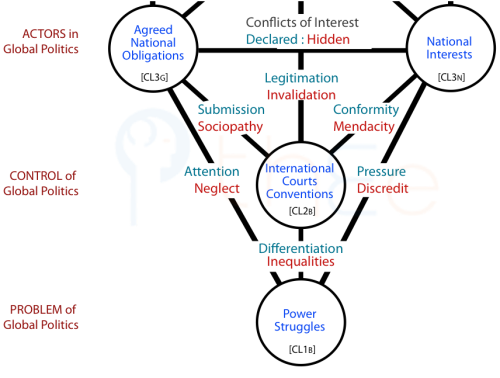International Rule of Law and National Interests (CL2 & CL3)
CL2: Global Rule of Law
There is no equivalent to a society's at the international level: the closest are UN conventions and charters and an emerging canon of international law with international courts.
Power issues and pragmatics often determine whether any particular treaty, convention or international law is taken seriously at any moment. The 'balance of power' approach commenced some centuries ago inhibits but does not prevent wars and global disorder: as witnessed in the 20th Century.
A global system that is anarchic but not chaotic is to be welcomed. Anarchy, as a system of social organization, is built on individual-member’s voluntary cooperation and responsibility. It rejects any form of coercion by «higher» governance institutions.
The issue remains as to whether individual nations are prepared to be constructively anarchic rather than encouraging violence. Many internal civil wars or coups or «freedom» movements have been, and still are, stoked by leaders of larger nations as if this was perfectly reasonable behaviour and desired by their public.

CL3: Nations & States
Nations and states that engage in the are pressured by two phenomena revealed by the national v global duality: namely () and ().
would be expected to dominate , especially given that this dominance is natural and understandable within the nation-state. However, in the geopolitical context, it is disturbing to notice that powerful nations often refuse to accept obligations acceptable to most others.
![]() More about Rejection of Obligations:
More about Rejection of Obligations:
Using the labels developed for the national frame of reference, it seems that nation-states often use the Channels negatively and destructively—always on the grounds of national security.
A further effect of the focus on national security is to tilt the internal balance of power towards the state rather than the individual.
Originally posted: July 2009; Last updated: 12 June 2014.